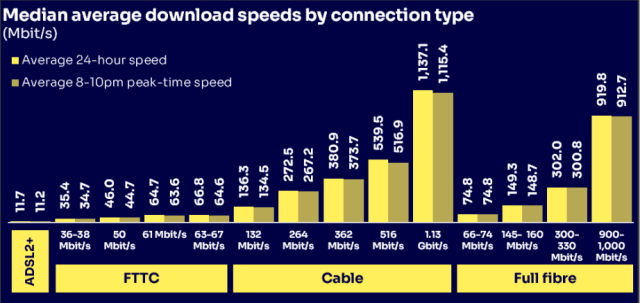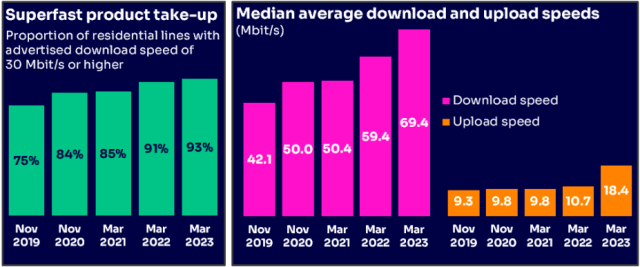Ofcom, the UK’s communications regulator, has released its research findings on the performance of home broadband services in the United Kingdom.
 The report highlights several key trends and improvements in broadband speeds and connectivity across the nation.
The report highlights several key trends and improvements in broadband speeds and connectivity across the nation.
Download Speeds Surge
One of the most notable findings in the report is the significant increase in average download speeds for home broadband users. As of March 2023, the average download speed has reached 69.4 megabits per second (Mbit/s), marking a remarkable 17 percent year-on-year increase. This substantial boost in download speeds can be attributed to the growing adoption of higher-bandwidth services, particularly full-fibre connections.
Download speeds play a crucial role in determining how quickly information is delivered to users’ devices. This increase in speed is particularly beneficial for tasks such as downloading large files, streaming high-resolution video content, or online gaming.
Furthermore, the report indicates that 88 percent of broadband lines in March 2023 enjoyed an average 24-hour download speed of at least 30 Mbit/s, a notable increase from 83 percent in March 2022. Only 3 percent of connections exhibited an average 24-hour download speed of less than 10 Mbit/s in 2023, down from 4 percent in the previous year. Additionally, less than 1 percent of broadband lines had an advertised download speed under 10 Mbit/s.
 Upload Speeds Soar
Upload Speeds Soar
In addition to download speeds, upload speeds have also witnessed a substantial boost, reaching an average of 18.4 Mbit/s in March 2023. This reflects a significant year-on-year increase of 7.8 Mbit/s, representing a remarkable 73 percent growth.
Urban-Rural Divide Narrows
Ofcom’s report further highlights a narrowing of the broadband speed gap between urban and rural areas in the UK. During the peak-time period of 8 pm to 10 pm, the difference between average urban download speeds (70.3 Mbit/s) and rural download speeds (56.0 Mbit/s) was only 26 percent. This is a noticeable decrease from the 58 percent gap observed in 2022.
Cable and Full-Fibre Lead in Speeds
The research also indicates that cable and full-fibre packages offer the fastest download speeds. Cable connections saw the most substantial increase in average download speed, surging by 71.3 Mbit/s (36 percent) to reach 270.6 Mbit/s. Full-fibre connections also recorded an average download speed increase of 1.9 Mbit/s (1 percent) year-on-year, reaching 149.2 Mbit/s.
Network Congestion and Speeds
The report acknowledges that average download speeds may slow down during periods of network congestion, also known as network contention. However, it notes that across all connections, the average 8 pm to 10 pm peak-time download speed was 95 percent of the average maximum speed, up from 94 percent in March 2022.
Similarly, the average daily minimum speed reached 89 percent of the average maximum speed, up from 87 percent in the previous year. Notably, full-fibre lines experienced the least impact from network congestion during busy periods.
In summary, Ofcom’s latest research demonstrates a positive trend in the performance of home broadband services in the UK, with download and upload speeds on the rise and improvements in narrowing the urban-rural digital divide. The report provides valuable insights for both consumers and the broadband industry as a whole, emphasizing the importance of high-speed connectivity in today’s digital landscape.
